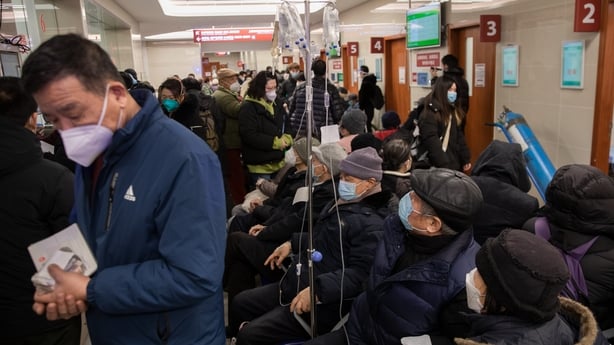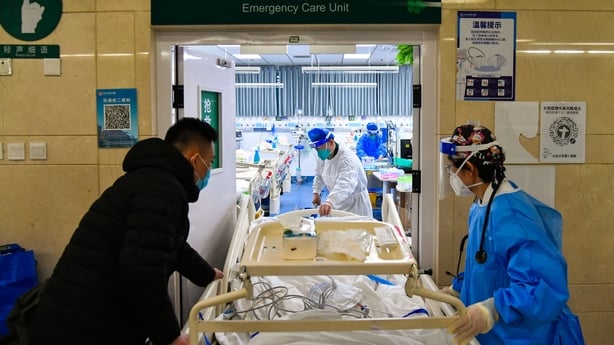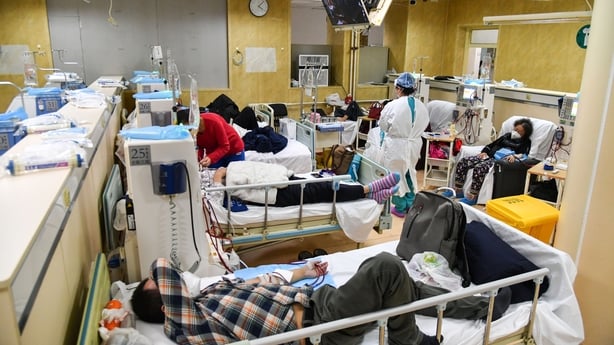European Union government officials have recommended that passengers flying from China to the EU should have a negative Covid-19 test before they board, as the Chinese government plans to ease travel restrictions despite a wave of new infections.
The recommendation comes from the EU's Integrated Political Crisis Response group (IPCR), which is a body made up of officials from the EU's 27 governments and is in line with a commendation made earlier by the European Commission.
China plans to ease travel restrictions on 8 January, despite a wave of new infections which has left Chinese hospitals and funeral houses overwhelmed.
The IPCR also recommended that all passengers on flights to and from China should wear face masks, that EU governments introduce random testing of passengers arriving from China and that they test and sequence wastewater in airports with international flights and planes arriving from China.
It comes as a senior official at the World Health Organization said China's Covid-19 data is not giving an accurate picture of the situation there and underrepresents the number of hospitalisations and deaths from the disease.
The comment came as the UN agency prepares to meet with Chinese scientists again tomorrow as part of a wider briefing among member states on the global Covid-19 situation.
"We believe that the current numbers being published from China underrepresent the true impact of the disease in terms of hospital admissions, in terms of ICU admissions, particularly in terms of death," said Mike Ryan, WHO's emergencies director, at a media briefing.
Earlier in the briefing, WHO Director-General Tedros Adhanom Ghebreyesus reiterated that the agency is "concerned" about the surge in Covid-19 infections in China and urged the Chinese government again to deliver rapid and regular data on hospitalisation and death there.
"We continue to ask China for more rapid, regular, reliable data on hospitalisations and deaths, as well as more comprehensive, real-time viral sequencing," he said at a media briefing.
"WHO is concerned about the risk to life in China and has reiterated the importance of vaccination, including booster doses to protect against hospitalisation, severe disease and death."

China axed its stringent virus curbs last month and since then funeral homes have reported a spike in demand for their services, hospitals are packed with patients, and international health experts predict at least one million deaths in China this year.
But officially, China has reported a small number of Covid deaths since the policy U-turn and has played down concerns about a disease that it was previously at pains to eradicate through mass lockdowns even as the rest of the world opened up.
"China and the Chinese people will surely win the final victory against the epidemic," Chinese Communist Party mouthpiece the People's Daily said in an editorial, rebutting criticism of its tough anti-virus regime that triggered historic protests late last year.

As it now dismantles those restrictions, China has been particularly critical of decisions by some countries to impose a requirement for a Covid test on its citizens, saying they are unreasonable and lack scientific basis.
Japan became the latest country to mandate pre-departure Covid testing for travellers from China, following similar measures by the United States, Britain, South Korea and others.
China, which has been largely shut off from the world since the pandemic began in late 2019, will stop requiring inbound travellers to quarantine from 8 January. But it will still demand that arriving passengers get tested before they begin their journeys.
China reported five new Covid-19 deaths for yesterday, compared with three a day earlier, bringing the official death toll to 5,258, very low by global standards.
But the toll is widely believed to be much higher. British-based health data firm Airfinity has said about 9,000 people in China are probably dying each day from Covid.
Despite some countries imposing restrictions on Chinese visitors, interest in outbound travel from the world's most populous country is cranking up, state media reported.
Bookings for international flights from China have risen by 145% year-on-year in recent days, the government-run China Daily newspaper reported, citing data from travel platform Trip.com.
The number of international flights to and from China is still a fraction of pre-Covid levels. The government has said it will increase flights and make it easier for people to travel abroad.
Thailand, a major destination for Chinese tourists, is expecting at least five million Chinese arrivals this year, its tourism authority has said.

But there are already signs that an increase in travel from China could pose problems abroad.
South Korea, which began testing travellers from China for Covid on Monday, said more than a fifth of the test results were positive.
Authorities there were searching or one Chinese national who tested positive but went missing while awaiting quarantine.
Meanwhile, the global airline association has criticised decisions by governments to impose Covid tests and other measures on travellers from China as ineffective "knee-jerk" reactions.
"It is extremely disappointing to see this knee-jerk reinstatement of measures that have proven ineffective over the last three years," Willie Walsh, director general of the International Air Transport Association, said in a statement.
IATA, which represents 300 airlines accounting for 83% of total air traffic, argued that the coronavirus is already circulating widely within the borders of countries imposing the tests.
"Research undertaken around the arrival of the Omicron variant (in late 2021) concluded that putting barriers in the way of travel made no difference to the peak spread of infections," Mr Walsh said.
"We have the tools to manage Covid-19 without resorting to ineffective measures that cut off international connectivity, damage economies and destroy jobs," he said.
Global passenger traffic, which was decimated by the emergence of Covid-19 in 2020, is expected to have reached 70.6% of its pre-crisis level in 2022 - less than previously forecast as China had maintained strict travel restrictions.
Beijing has called the mounting international restrictions on travellers from its territory "unacceptable" and warned that it could take countermeasures "based on the principle of reciprocity".

